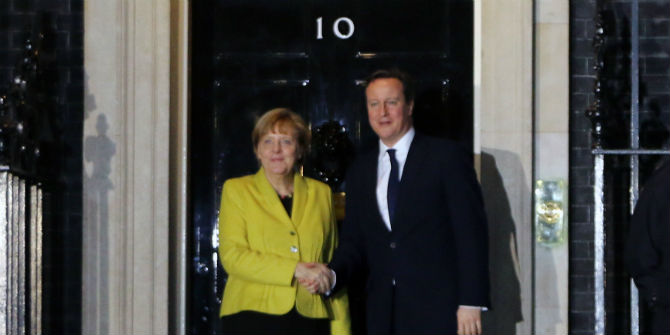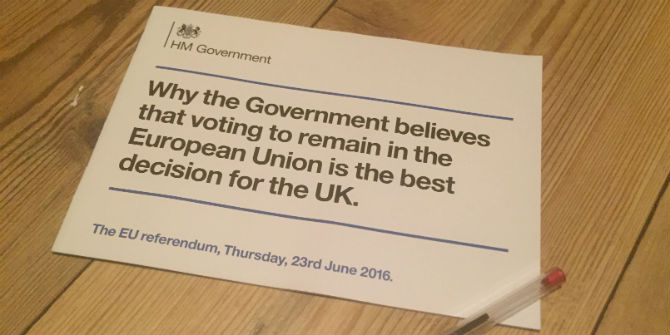A European Union without Britain would make Germany even more dominant – but that is not necessarily what Angela Merkel wants, as Hans Kundnani explains. Other member states already resent German hegemony and the pressure on the Chancellor to solve the migrant crisis would only increase.
Chancellor Angela Merkel has made it clear that she thinks a British withdrawal from the European Union would be bad for Germany. Ahead of the European Council last week, she told the Bundestag that keeping Britain in the EU was “not just in Britain’s but also in Germany’s interest”. She supported David Cameron in his renegotiation of the UK’s relationship with the EU, while at the same time seeking to defend the principles of freedom of movement and non-discrimination.
The usual argument that Germans – particularly on the right – make is that, were the UK to leave the EU, Germany would lose a liberal ally on economic policy and be left alone in the EU with more protectionist countries such as France. It is sometimes even said that Germany benefits from the UK’s more aggressive attempts to reform the EU. A good example is Cameron’s drive, as part of the renegotiation, to increase Europe’s “competitiveness” – one of Merkel’s favourite words.
However, this argument that Germany and the UK are like-minded countries is a little disingenuous, because Germany is not quite as liberal as is sometimes suggested. While it is all for trade liberalisation beyond the EU, it is one of the countries that has blocked internal steps such as the completion of the single market in services. Germany has a somewhat schizophrenic economy with a hyper-competitive export industry but a rather protected service sector. Germans also have different views on financial services – even on the right, for example, there is support for a financial transactions tax. In short, Germany is aligned with the UK on some but not all issues.
The real question therefore is whether Germany would be more or less powerful within the EU without the UK. At a first glance, it seems like a straightforward question. Germany would be more powerful within the EU if the UK were to leave simply because its relative weight – expressed, for example, in voting in the European Council or seats in the European Parliament – would be increased. Indeed, some officials from other EU member states – even those that are usually seen as aligned with German views or opposed to British ones – say in private that this is precisely why they do not think it would be in their interests for the UK to leave.

Since the euro crisis began in 2010, there has been much discussion about German “hegemony” within the EU. The events of the last six years, in particular the refugee crisis, have demonstrated the limits of German power as much as the extent of it. Moreover, the UK is already outside of the euro and Schengen areas, where most of the bitterest intra-EU battles now take place. Nevertheless, some fear that were the UK to leave the EU altogether, Germany would really be a hegemon. They say that none of the other four large member states – France, Italy, Poland and Spain – would be able to “counterbalance” German power.
However, this is to exaggerate the real extent of German power in the EU. Even within the eurozone, Germany makes up only 28 percent of total GDP – France (21 percent) and Italy (16 percent) together make up a bigger share. This illustrates that Germany is not a hegemon at all – with or without the UK – but rather a “semi-hegemon”. In that sense, as I argue in my book, The Paradox of German Power, Germany has returned to the position it occupied in Europe between 1871 and 1945 – except in geo-economic rather than geopolitical form.
Part of the nature of this semi-hegemonic position is that it leads to a perception of dominance and therefore resistance – in particular through the formation of coalitions to balance against German power. Indeed, that has been part of the story of what has happened in Europe since the beginning of the euro crisis: the south has resisted Germany on economic policy and the east has resisted it on refugee policy. In both cases, Germany has been accused of “imperialism”.
A British withdrawal from the EU could increase this perception of German dominance – and with it the pressure on other countries to form coalitions to “counterbalance” against German power. Paradoxically, therefore, Germany could in reality be weaker in an EU without the UK. Meanwhile, given its greater relative weight, expectations of Germany would likely increase further – leading to even greater anger at Germany than at present for its inability or unwillingness to solve Europe’s problems.
Some Germans – especially federalists such as Wolfgang Schäuble – might like the idea of an EU without the UK. In particular, it is tempting to think the EU would be able to move ahead more quickly with further steps in integration without its most difficult member state blocking them or demanding opt-outs. It would certainly make the EU more synonymous with the eurozone (Denmark would be the only remaining country with a permanent “opt-out” from Economic and Monetary Union) and potentially more homogenous and less messy in institutional terms. But most Germans, including Merkel, know deep down that, ultimately, an EU without the UK would be bad for them.
This post represents the views of the author and not those of the BrexitVote blog, nor the LSE.
Hans Kundnani is the former research director of the European Council on Foreign Relations and the author of The Paradox of German Power.








And how effectively, would you say, has the South resisted Germany on economic policy?
Are the “Krauts” for the Brexit because then they would play role N° 1 in the EU and get rid of the constant demands of UK “renegotiation” and “reform” inititiatives of the UK? Probably they would, especially as
they don’t like the UK protecting their tax havens like Isle of Man, Gurnsey, Turks and Caiocs Islands, Virgin Islands, Bahamas etc. If the “Outists” win, it means that about 2 million British citizens living in EU countries would possibly have to leave and sell their EU residences, making real estate acquisitions for EU citizens more accessibole, as prices would decrease. They dion’t care if the influx of these 2 million would on the other hand lead to an increase of the already high property prices in the UK. After all, England is an island, so British should stay being islanders and EU citizens can remain “Continentals” without having to worry
about the UK which hitherto was only a half-hearted member of the Union.